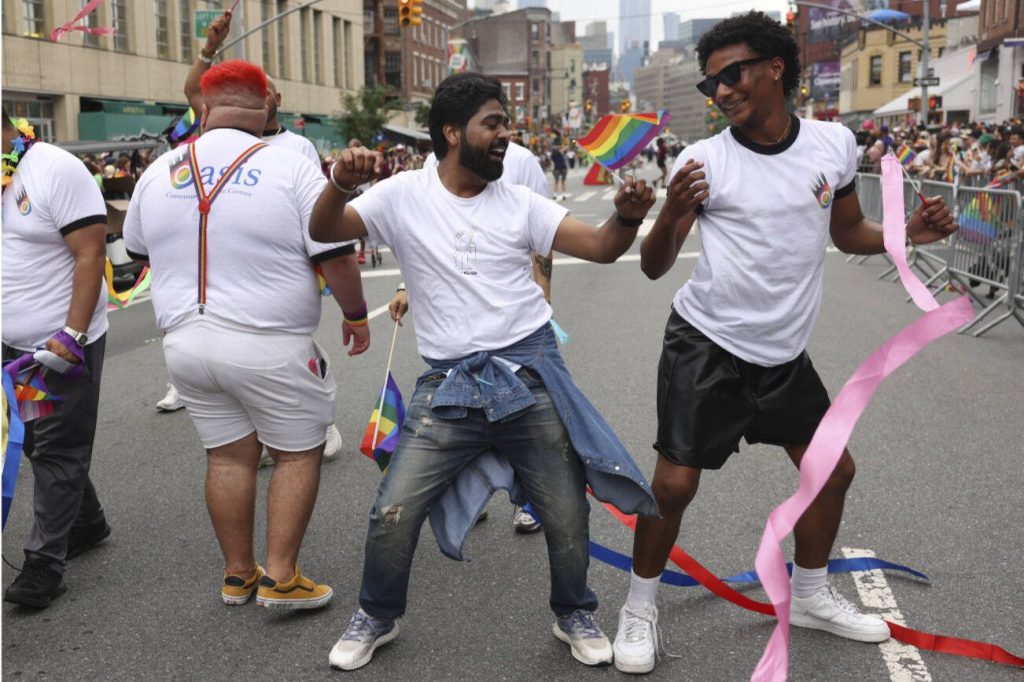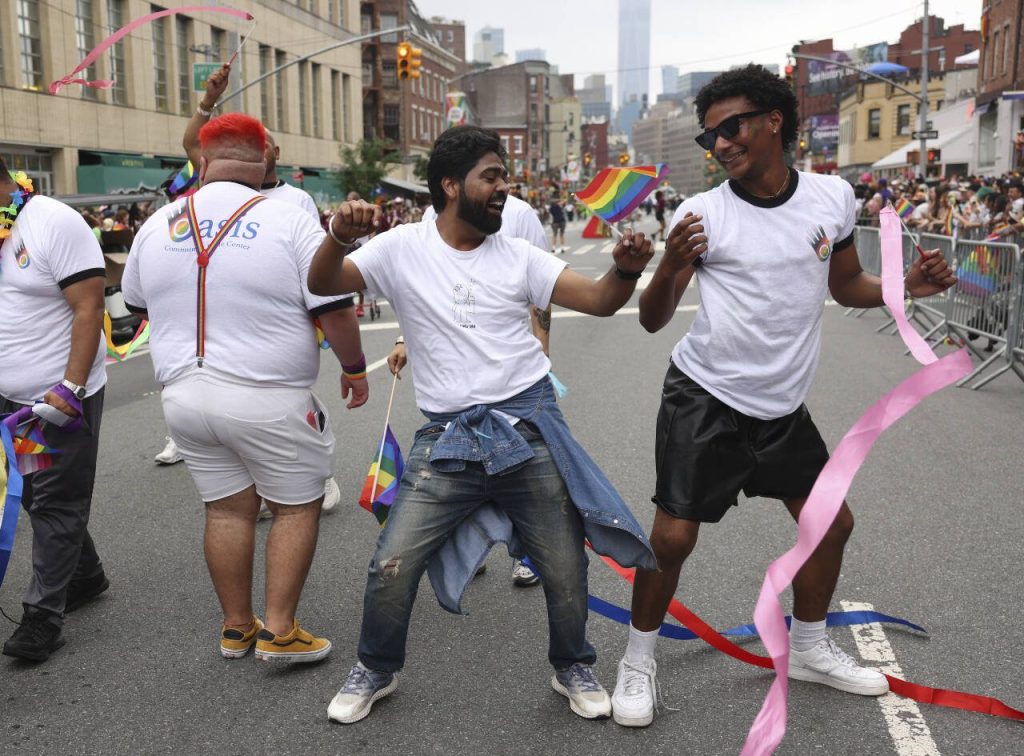Comment: Where Trump, Harris tickets stand on LGBTQ issues
Published 1:30 am Sunday, October 13, 2024


By Marie-Amelie George / The Conversation
Polls show that LGBTQ rights will likely factor into most Americans’ pick for president this November as they choose between former Republican President Donald Trump and Vice President Kamala Harris, a Democrat.
A March 2024 survey by independent pollster PRRI found that 68 percent of voters will take LGBTQ rights into consideration at the polls. Fully 30 percent stated that they would vote only for a candidate who shares their views on the issue.
It is no coincidence, then, that LGBTQ rights issues feature prominently in the party platforms.
The Republican Party’s electoral promises include cutting existing federal funding for gender-affirming care and restricting transgender students’ participation in sports. Meanwhile, the Democratic Party platform proposes to outlaw discrimination against LGBTQ people, including passing the Equality Act, which would prohibit discrimination based on sexual orientation and gender identity in housing, health care and public accommodations.
As a legal scholar who has written extensively on the history of LGBTQ rights, I have seen that the clearest indication of how a politician will act once in office is not what they promise on the campaign trail. Instead, it’s what they have done in the past.
Let’s examine their records.
Trump restricted some LGBTQ rights: Trump and his running mate, U.S. Sen. J.D. Vance of Ohio, are both relatively new to politics, so their records on LGBTQ rights issues are slim.
Trump enacted two policies restricting LGBTQ rights early in his one term in office. The first was his 2017 executive order Promoting Free Speech and Religious Liberty, which reinforced that federal law must respect conscience-based objections to comply with the First Amendment. This order indirectly imperiled LGBTQ rights because many LGBTQ rights battles are fought over whether conservative Christian businesses run afoul of anti-discrimination laws when they refuse to serve same-sex couples.
A few months later, Trump banned transgender individuals from serving in the U.S. armed forces. He ultimately revoked the directive, implementing instead a new policy that allowed existing transgender soldiers to remain in the military but barred new transgender recruits from enlisting.
Vance has opposed trans rights: Vance, a one-term senator, has accrued a record of trying to roll back the rights of transgender Americans during his short time in public office.
Between 2023 and 2024, Vance introduced or sponsored five bills opposing trans rights. One seeks to restrict gender-affirming care for minors by imposing criminal sanctions on doctors who perform such surgeries; another aims to do the same by exposing physicians to civil liability for either prescribing gender affirming hormones or performing surgeries.
Another Vance bill would expand health care workers’ ability to make conscience-based objections to transgender rights. One more would amend Title IX, which prohibits discrimination based on sex in education, to limit transgender student participation in athletics.
Vance has also tried to pass legislation that would stop the Department of State from issuing passports with an unspecified “X” gender designation, a policy that launched in 2021. Gender-neutral passports allow transgender, intersex and nonbinary individuals to carry identity documents that reflect their gender identity and avoid what can be significant problems getting through airport security with misgendered IDs.
Congress has not voted on any of these proposals.
A ‘legislative priority’ for Harris: Harris and her vice presidential pick, Minnesota Gov. Tim Walz, have both made LGBTQ rights a legislative priority throughout their long political careers.
Harris initially took public office in 2003 as San Francisco’s district attorney. In that role, she established a hate crimes unit that prosecuted violence against LGBTQ youth in schools. She also trained prosecutors nationwide to counter the “gay panic” and “trans panic” defenses in court, which is when lawyers attempt to justify violence as a fear-based reaction to the victim’s sexual orientation or gender identity.
Harris was elected California’s attorney general in 2011 and declined to defend the state’s ban on same-sex marriage when opponents challenged the law’s constitutionality before the U.S. Supreme Court. She also joined amicus briefs supporting transgender bathroom access after North Carolina barred transgender people from using bathrooms that did not match the gender on their ID.
Harris, however, did not unequivocally champion LGBTQ rights. In 2015, she opposed two prisoners’ request for urgent gender-confirmation surgery. She has since called for a “better understanding” of transgender health needs.
As a U.S. senator from 2017 to 2021, Harris sponsored bills proposing to better address distinct LGBTQ issues in health care and the criminal justice system. She also sponsored five Senate bills to prohibit discrimination based on sexual orientation and gender identity in employment, housing and public accommodations. Other bills she sponsored focused on LGBTQ youth, aiming to prohibit discrimination in child welfare programs and barring federal funds from supporting so-called conversion therapy of LGBTQ teens.
The Senate did not vote on any of these bills.
As vice president, Harris has been part of what advocates describe as the most pro-LGBTQ administration in U.S. history.
Since 2021, President Joe Biden has issued multiple executive orders to combat discrimination against the LGBTQ community, including by eliminating the Trump-era restrictions on transgender military service. Biden also signed into law the Respect for Marriage Act, which changed the federal definition of marriage from “a man and a woman” to “two individuals.” The statute ensures that the federal government would continue to recognize same-sex unions if the Supreme Court ever reversed its decision to legalize marriage equality.
Walz: Ally in the statehouse: Harris’ vice-presidential pick has a similarly extensive record backing LGBTQ rights.
As a U.S. representative from 2007 to 2019, Walz supported efforts to grant federal benefits to same-sex couples before marriage equality became federal law. He also co-sponsored many of the House versions of the same bills as Harris.
As Minnesota’s governor, Walz has issued several executive orders promoting LGBTQ inclusion and equity and banned conversion therapy for minors. He also declared Minnesota as a “trans refuge state” that will not enforce laws interfering with children’s access to gender-affirming care.
Starkly different records: If elected, Trump has promised to cut federal funds for public schools that “push … gender ideology” and “keep men out of women’s sports.” Harris pledges to “defend the freedom to love who you love openly and with pride.”
As citizens head to the polls in November, they can be confident that, on this topic at least, the candidates mean what they say.
Marie-Amelie George is a professor of law at Wake Forest University, specializing in LGBTQ+ rights, civil procedure and family law. This article is republished from The Conversation under a Creative Commons license.






